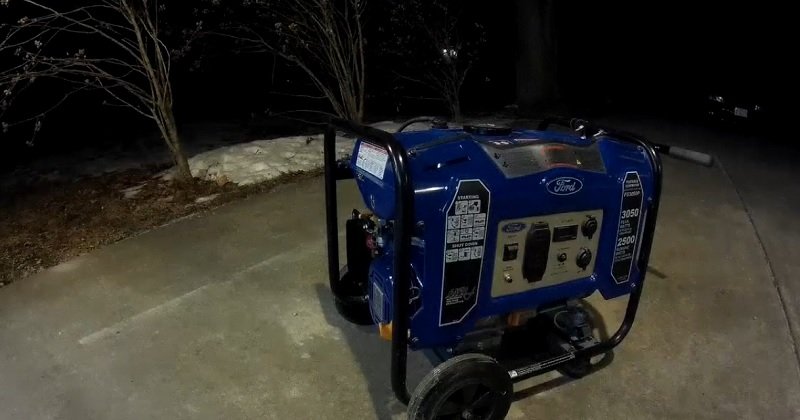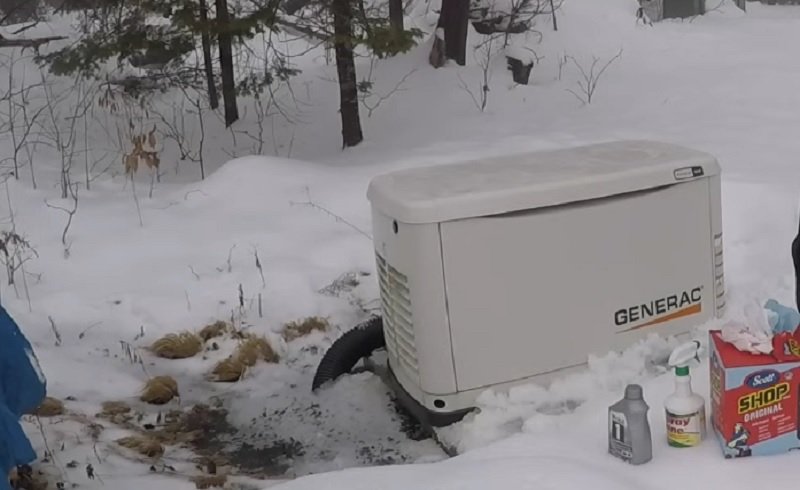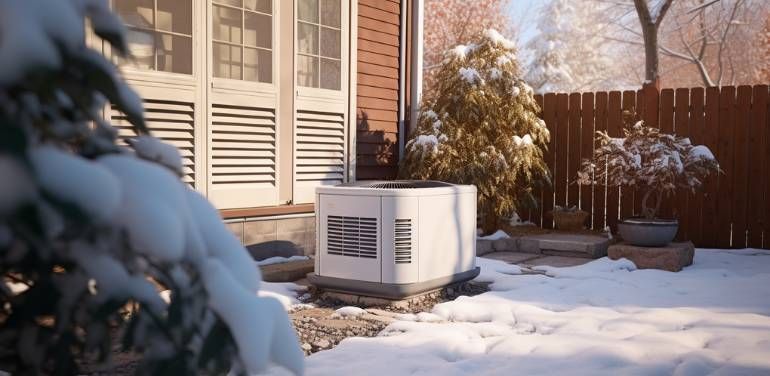Disclosure: This post contains affiliate links and I will be compensated if you make a purchase after clicking through my links. Learn More
To keep a generator from freezing, store it in a dry, insulated area and use a cold weather kit. Regular maintenance is essential.
Generators are vital during power outages, especially in winter. Freezing temperatures can damage your generator, leading to costly repairs. Storing your generator in a dry, insulated location helps prevent freezing. A cold weather kit, including battery warmers and block heaters, ensures smooth operation in low temperatures.
Regular maintenance, such as checking fluid levels and testing the generator, is crucial. These steps not only protect your generator but also ensure reliable performance. Proper care and preparation can save you from unexpected generator failures during harsh winter conditions.

Importance Of Preventing Freezing
Generators are crucial for emergency power supply during cold weather. Keeping them from freezing ensures their efficiency and longevity. Understanding the importance of preventing freezing can save both time and money.
Risks Of A Frozen Generator
A frozen generator can lead to several issues:
- Engine Damage: Ice can crack engine parts, causing permanent damage.
- Fuel System Issues: Fuel can freeze, blocking the system.
- Battery Failure: Cold weather drains battery life quickly.
- Reduced Efficiency: Frozen parts work less efficiently, wasting fuel.
Benefits Of Proper Maintenance
Proper maintenance prevents freezing and offers numerous benefits:
- Increased Lifespan: Well-maintained generators last longer.
- Reliable Performance: Regular checks ensure reliable power during emergencies.
- Cost Savings: Preventative care reduces costly repairs.
- Safety: Maintenance minimizes risks of accidents and malfunctions.
For a quick maintenance guide, consider the following tips:
| Task | Frequency |
|---|---|
| Check Battery | Monthly |
| Inspect Fuel System | Bi-Annually |
| Clean Air Filters | Quarterly |
| Run Generator | Monthly |
Keeping a generator from freezing ensures it runs efficiently. Regular maintenance is key to avoiding costly repairs. By following these steps, your generator will be reliable and safe during winter.
Choosing The Right Location
Choosing the right location for your generator is crucial. This ensures it operates effectively and does not freeze during cold weather. Proper placement can significantly improve your generator’s lifespan and performance.

Ideal Placement
The ideal placement for a generator is a spot with ample ventilation. This helps in dissipating heat and prevents freezing. Ensure the generator is placed on a flat, stable surface. It should be away from windows, doors, and vents to avoid carbon monoxide poisoning.
Consider using a generator enclosure. This provides extra protection against weather elements. Ensure it is weatherproof and allows adequate airflow. Elevating the generator off the ground can also help. This avoids contact with snow and ice.
Avoiding Common Mistakes
Avoid placing the generator in an enclosed space without ventilation. This can lead to overheating and freezing issues. Do not place the generator under trees. Falling branches and leaves can damage it and block the vents.
Avoid placing the generator directly on the ground. Moisture from the ground can cause rust and freezing. Do not place the generator near flammable materials. This can lead to fire hazards.
| Ideal Placement | Avoid |
|---|---|
| Ample ventilation | Enclosed spaces |
| Flat, stable surface | Under trees |
| Generator enclosure | Directly on the ground |
| Elevated position | Near flammable materials |
Insulating Your Generator
Generators are crucial during cold months but can freeze. Insulating your generator keeps it running smoothly. This section covers types of insulation and DIY tips.
Types Of Insulation
Different insulation types suit various needs. Knowing them helps choose the right one.
| Type | Description | Pros | Cons |
|---|---|---|---|
| Foam Insulation | Flexible and easy to install | Lightweight, Affordable | Less durable in extreme cold |
| Fiberglass Insulation | Thick and effective | Highly efficient, Durable | Needs professional installation |
| Blanket Insulation | Wraps around the generator | Reusable, Versatile | Can be bulky |
Diy Insulation Tips
DIY methods can be cost-effective and fun. Follow these steps to insulate your generator.
- Gather materials: foam, blankets, tape, and scissors.
- Measure: Measure the generator’s dimensions.
- Cut materials: Cut foam or blanket to size.
- Wrap: Wrap the generator in the insulation.
- Secure: Use tape to hold the insulation in place.
Remember to leave vents open. Your generator needs airflow to work.
Insulating your generator is easy with the right materials. Keep it warm and running smoothly all winter long.
Using Engine Block Heaters
Generators can freeze in cold weather. Using engine block heaters can help. These devices keep the engine warm. This prevents the generator from freezing.
How They Work
Engine block heaters warm the engine. They use electricity to do this. The heater goes in the engine block. This keeps the engine warm even in cold weather. A warm engine starts easily. This saves time and effort.
Installation Guide
Installing an engine block heater is easy. Follow these steps:
- Turn off the generator. Unplug it from any power source.
- Find the heater port. It is usually on the engine block.
- Insert the heater. Make sure it fits well.
- Plug in the heater. Use an extension cord if needed.
- Test the heater. Make sure it works before turning on the generator.
Here is a quick reference table:
| Step | Action |
|---|---|
| 1 | Turn off the generator |
| 2 | Find the heater port |
| 3 | Insert the heater |
| 4 | Plug in the heater |
| 5 | Test the heater |
Regular Maintenance
Keeping your generator from freezing requires regular maintenance. Proper care ensures your generator runs smoothly. Regular checks prevent costly repairs. This section covers essential maintenance steps.
Checking Fluids
Fluids play a crucial role in your generator’s performance. Check engine oil levels regularly. Low oil can cause your generator to overheat. Use the dipstick to measure oil levels.
Monitor coolant levels to prevent freezing. Coolant keeps your engine cool and prevents it from freezing. Always use the correct coolant type for your generator. Consult your manual for guidance.
Inspect the fuel tank for adequate fuel levels. Low fuel can cause your generator to stop working. Ensure there’s enough fuel, especially in winter. Use a fuel stabilizer to prevent fuel from freezing.
Routine Inspections
Routine inspections help identify potential issues early. Inspect belts and hoses for wear and tear. Replace damaged parts immediately. Worn belts can break, causing your generator to fail.
Check battery connections for corrosion. Clean any corrosion with a wire brush. Ensure the battery is charged. A weak battery can hinder your generator’s performance.
Look for loose bolts and tighten them. Vibrations can cause bolts to loosen over time. Tight bolts ensure all parts stay secure.
| Maintenance Task | Frequency |
|---|---|
| Check Engine Oil | Monthly |
| Monitor Coolant Levels | Monthly |
| Inspect Belts and Hoses | Quarterly |
| Check Battery Connections | Monthly |
By following these maintenance tips, you can keep your generator in top condition. Regular maintenance ensures your generator works reliably during cold weather.
Emergency Preparedness
Winter storms can wreak havoc on your power supply. Keeping your generator from freezing is crucial. Being prepared can save you from many cold nights. In this section, we will guide you through essential tools and quick fixes.
Essential Tools
Having the right tools is vital for keeping your generator running. Below is a list of tools you should have:
- Cold Weather Kit: This includes battery warmers and oil heaters.
- Insulated Cover: Keeps the generator protected from snow and ice.
- Extension Cords: Ensure you have outdoor-rated cords.
- Fuel Stabilizer: Prevents fuel from freezing.
These tools can make a significant difference. They help in maintaining the generator’s efficiency.
Quick Fixes
Sometimes, you need quick solutions to keep your generator from freezing. Here are some effective fixes:
- Use a Space Heater: Place it near the generator to keep it warm.
- Move It Indoors: If safe, place the generator in a garage.
- Cover with a Tarp: Use a heavy-duty tarp to shield it from snow.
- Check Fluids Regularly: Keep engine oil and coolant at optimal levels.
These fixes are easy and quick to implement. They can prevent your generator from freezing in emergencies.
Monitoring Weather Conditions
Monitoring weather conditions is crucial to keep your generator from freezing. Knowing the weather forecast helps you prepare in advance. This section will guide you on using weather apps and understanding alerts.

Using Weather Apps
Weather apps are essential tools for monitoring weather conditions. Many apps offer real-time updates. These updates include temperature, humidity, and wind speed. Some popular weather apps are:
- The Weather Channel
- AccuWeather
- Weather Underground
These apps can send notifications about weather changes. Setting alerts for temperature drops can help you take action quickly. Always keep your app updated for the latest features.
Understanding Alerts
Understanding weather alerts is key to protecting your generator. Alerts provide crucial information on severe weather. Common alerts include:
| Alert Type | Description |
|---|---|
| Freeze Warning | Temperatures are expected to drop below freezing. |
| Frost Advisory | Frost is likely to form overnight. |
| Winter Storm Warning | Severe winter weather is imminent. |
Set your weather app to notify you of these alerts. Pay attention to the details in each alert. This helps you take preventive measures for your generator. Use alerts to stay one step ahead of freezing conditions.

Professional Help
Keeping a generator from freezing can be challenging. Sometimes, professional help is necessary. This ensures your generator remains in top condition.
When To Call A Technician
Your generator might show signs of trouble. These signs include strange noises and difficulty starting. If the generator doesn’t start, it needs a technician.
A technician can identify issues before they worsen. Freezing temperatures can damage the generator. A technician can prevent this damage.
Choosing The Right Service
Choosing the right service is important. Look for certified professionals. They should have experience with generators.
Check online reviews. Ask friends for recommendations. Ensure the service offers emergency help. This is crucial during winter.
Here are factors to consider:
- Experience: Choose a service with many years in the field.
- Certification: Ensure technicians are certified and trained.
- Availability: They should offer 24/7 emergency help.
- Reviews: Read customer reviews for feedback.
A good service ensures your generator stays functional. This keeps your home warm during cold days.
Frequently Asked Questions
How Can I Prevent My Generator From Freezing?
Store it in a warm, dry place. Use an insulated cover and ensure proper ventilation.
What Fuel Type Is Best For Cold Weather?
Use winterized fuel or a fuel stabilizer. These options are less likely to freeze in cold conditions.
Should I Run My Generator Regularly In Winter?
Yes, run it periodically. This keeps the engine parts lubricated and prevents freezing.
How To Insulate A Generator For Winter?
Use a thermal blanket or insulated cover. These materials help maintain the generator’s temperature.
Final Words
Preventing your generator from freezing is essential. Regular maintenance, proper storage, and using a cold-weather kit can help. Protecting your investment ensures reliable performance in harsh conditions. Follow these tips to keep your generator running smoothly all winter. Stay prepared and keep your power supply uninterrupted.








